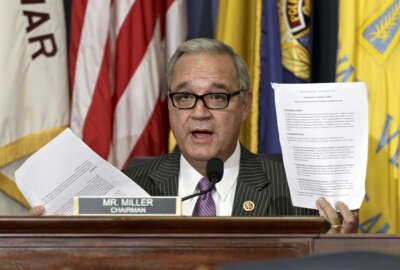
5 federal workforce bills the Senate passed last weekend
The Senate had a busy weekend, passing five major pieces of legislation that will impact veterans, inspectors general, FBI whistleblowers and others before the...
A short-term omnibus spending bill, which will keep the government open through April 28, isn’t the only thing the Senate passed last weekend.
The chamber was busy, signing off on a slew of other bills related to federal property, veterans benefits, whistleblowers and more.
Here are five important pieces of legislation that cleared the Senate this weekend and now await President Barack Obama’s signature.
Real property reform
The Senate signed off on real property legislation Saturday morning, which creates and charges a governmentwide council to develop ideas for better property management.
A specific executive director will lead the council, which will also include real property managers from each agency, as well as the head of the General Services Administration and deputy director for management at the Office of Management and Budget.
The council should write a real property management plan, which would include performance metrics and specific goals for agencies to meet.
In addition, the bill requires the U.S. Postal Service to identify a list of its own properties that federal agencies could potentially use.
Rep. Jeff Denham (R-Calif.) introduced the legislation.
The Senate also passed the Federal Assets Sale and Transfer Act, which sets up a mechanism where the administration can identify underused or vacant federal property. It establishes a Public Buildings Reform Board, which will recommend specific property to consolidate, reconfigure or sell.
Denham also introduced this legislation, while Senate Homeland Security and Governmental Affairs Committee Chairman Ron Johnson (R-Wis.) is sponsoring the Senate companion.
Better access for inspectors general
It’s been a long battle for inspectors general, who have been waiting for the past two years on Congress to give them better access to the documents and information they need to complete investigations.
The Inspector General Empowerment Act specifically amends a section of the IG Act of 1978.
“[Passing] the IG Empowerment Act enhances the IGs’ ability to fight waste, fraud, abuse and misconduct, protects whistleblowers who share information with IGs, increases government transparency and bolsters the public’s confidence in the independence of IGs,” Justice Department Inspector General Michael Horowitz, who also serves as chairman of the Council of the Inspectors General on Integrity and Efficiency, said in a statement.
Horowitz has long pushed for the bill’s passage after the Justice Department’s Office of Legal Counsel made a decision in 2015, which required inspectors general to obtain permission from their agencies before gaining access to certain legal documents, such as wiretaps, credit information or grand jury proceedings.
The IG Empowerment Act also gives inspectors general better tools to access key evidence for their investigations.
Senate Judiciary Committee Chairman Chuck Grassley (R-Iowa) and House Oversight and Government Reform Committee Chairman Jason Chaffetz (R-Utah) were key sponsors of the legislation.
FBI whistleblowers
Whistleblowers at the FBI will soon begin to see some relief to the long and often intimidating disclosure process.
The Senate passed an abridged version of the FBI Whistleblower Protection Enhancement Act Saturday morning. Though the legislation doesn’t include a full overhaul to the disclosure process, it does protect FBI whistleblowers from retaliation if they report some sort of waste, fraud or abuse to their direct supervisors.
Under current procedure, FBI employees can only report wrongdoing to a certain group of senior officials.
Grassley, the bill’s sponsor, said the agency’s current regulations contradict the positive message FBI Director James Comey has spoken of publicly. He said he plans to pursue the remaining provisions in the FBI Whistleblower Protection Enhancement Act in the next Congress.
“The current process is vague, confusing and lacks common sense, and it often puts people in hot water for no legitimate reason,” Grassley said in a statement. “The protections in this bill ensure a logical reporting requirement that allows more cases to be heard on the merits instead of being senselessly dismissed because an FBI employee logically reported wrongdoing to [a] supervisor.”
Chaffetz sponsored the House version of the legislation.
Veterans health benefits
Though a far cry from the omnibus that the Senate Veterans Affairs Committee pushed, the chamber passed a series of bills that make small changes to veterans health care and benefits.
The Jeff Miller and Richard Blumenthal Veterans Health Care and Benefits Improvement Act streamlines portions of the disability compensation and benefits process and adds two more judges who can make decisions in the often archaic and lengthy appeals process.
The bill was named for retiring House VA Committee Chairman Jeff Miller (R-Fla.) and outgoing Senate VA Committee Ranking Member Richard Blumenthal (D-Conn.).
“With 76 separate provisions, it is broad in scope and scale,” Blumenthal said in statement Saturday morning. “Hiring more mental health counselors and emergency room doctors will mean more veterans receive quality healthcare. Expanding eligibility for homelessness prevention programs will provide critical support to veterans at risk of homelessness. Extending critical education benefits to surviving family members will further our promise of education.”
One provision limits the time Veterans Affairs Department employees can spend on administrative leave in a given year to 14 days.
Another lets the VA secretary set more flexible schedules for the department’s physicians and nurses. Specifically, the bill gets rid of the 80-hour biweekly pay period, as long as doctors work at least 2,080 hours during a given calendar year. It’s a provision that Secretary Bob McDonald has actively pushed for this year as one of his main priorities.
Yet the omnibus package does not address many of the secretary’s other priorities, many of which were controversial issues that the department itself and veterans committees in both chambers of Congress spent the past year debating.
A solution to the veterans appeals process, new accountability procedures for VA employees or an extension or alternative to the Veterans Choice Program will all get punted to 115th Congress.
Open data
The Senate also cleared the Open, Public Electronic and Necessary (OPEN) Government Data Act.
The legislation, which Sen. Brian Schatz (D-Hawaii) introduced in April, codifies the Obama administration’s current open data policy. Specifically, it requires that agencies make their information available online in a machine-readable format. It also pushes chief information officers to publish higher quality data sets.
The bill did not get a vote in the House before lawmakers left Capitol Hill for the year, but senators could reintroduce the legislation in the 115th Congress in January.
Copyright © 2025 Federal News Network. All rights reserved. This website is not intended for users located within the European Economic Area.
Nicole Ogrysko is a reporter for Federal News Network focusing on the federal workforce and federal pay and benefits.
Follow @nogryskoWFED
Related Stories






